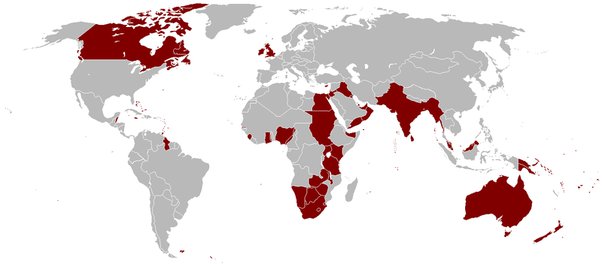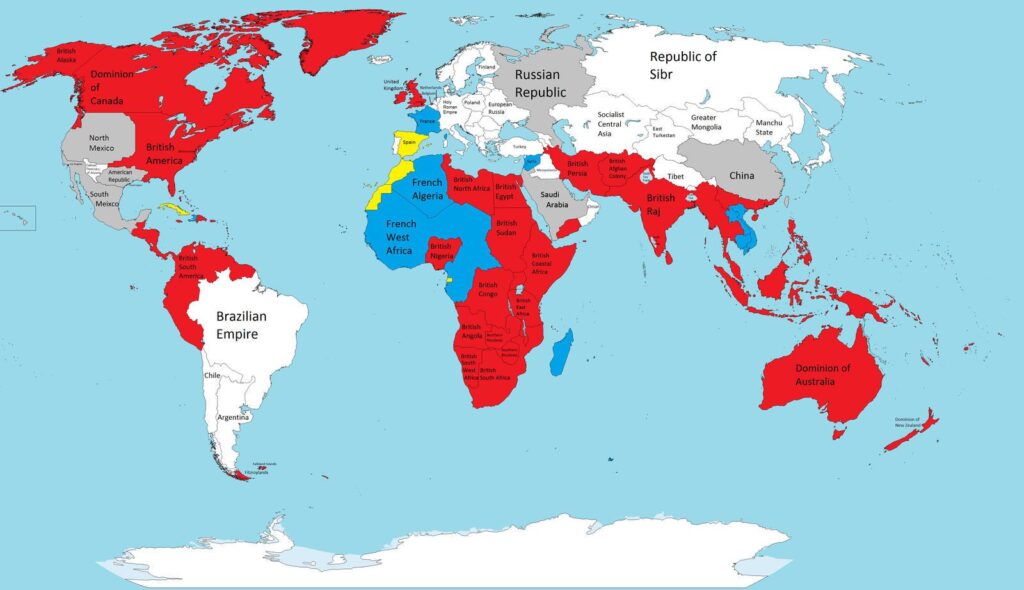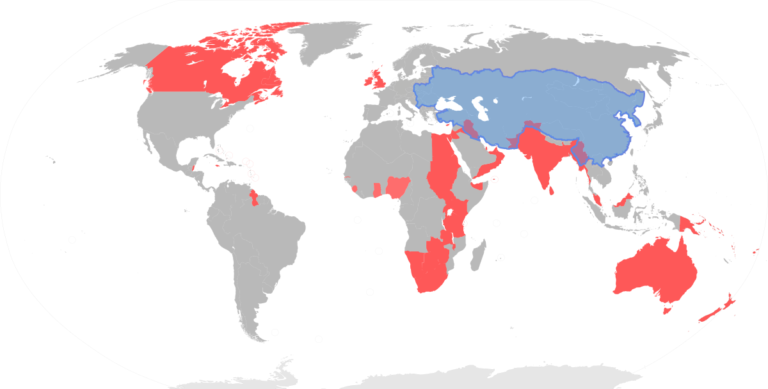The Roman Empire, spanning from around 27 BC to 476 AD in the Western Roman Empire, and the British Empire, which reached its peak in the early 20th century, were two of history’s most expansive and influential empires. The Roman Empire covered the Mediterranean, boasting advancements in engineering, law, and military strategies, leaving a lasting impact on Western civilization through its language, culture, and infrastructure. Governed through a mix of republicanism and autocracy, it spread Latin and established legal systems.
On the other hand, the British Empire was the largest in history, extending across the globe through direct rule, indirect governance, and settler colonies. Notable for its contributions to industrialization, trade networks, and technological advancements, it left an enduring imprint on language, law, and governmental structures. However, the British Empire’s legacy is marked by a complex blend of positive influences, like infrastructure development, alongside negative aspects, such as colonization, exploitation, and cultural imposition.
How did the Roman Empire Govern and Influence Culture?

The Roman Empire governed its vast territories through a combination of military power, administrative efficiency, and cultural assimilation. Here’s how they governed and influenced culture:
Governance
Administrative Structure
The Romans established a sophisticated administrative system, with a hierarchical structure that allowed for effective governance. They divided their territories into provinces, each governed by appointed officials responsible for taxation, justice, and maintaining order.
Law and Justice
Roman law, especially the Justinian Code, formed the basis of legal systems in many modern societies. The empire aimed for fair and consistent justice, influencing governance across their territories.
Military Might
The Roman military was a key instrument of governance. Legions were stationed in various regions to maintain control and expand the empire’s borders. The security provided by the military facilitated cultural exchange and trade.
Cultural Influence
Language and Literature
Latin served as the administrative and elite language in the empire. Roman literature, including works by Virgil, Ovid, Cicero, and others, became influential across Europe. Additionally, the translation and dissemination of Greek works further enriched Roman intellectual culture.
Architecture and Engineering
Roman architecture, characterized by structures like aqueducts, amphitheaters (e.g., the Colosseum), roads (like the famous Appian Way), and monumental buildings (such as the Pantheon), showcased their engineering prowess and influenced later architectural styles.
Religion
Initially, Romans practiced polytheism, but eventually adopted Christianity, which became the state religion under Emperor Constantine. The spread of Christianity profoundly impacted the empire’s culture and later influenced European societies.
Art and Sculpture
Roman art and sculpture were prominent forms of expression, often depicting historical events, gods, and important figures. Statues and mosaics reflected Roman ideals and values.
Urbanization and Infrastructure
Roman cities were centers of administration, commerce, and culture. They built extensive infrastructure, including sewage systems, public baths, and forums, shaping the urban landscape and societal interactions.
Cultural Integration
The Romans were adept at assimilating and incorporating aspects of conquered cultures into their own. This included adopting customs, gods, and practices from various regions, leading to a rich tapestry of cultural diversity within the empire.
The Roman Empire’s governance and cultural influence were foundational in shaping the development of Western civilization. Its legacy continues to be evident in various aspects of modern society, from legal systems to language, architecture, and cultural norms.
What Defined the British Empire’s Governance and Achievements?
The British Empire, one of the largest empires in history, was characterized by its expansive territorial control, diverse governance strategies, and numerous achievements. Several key elements defined its governance and accomplishments:
Governance
Colonial Administration
The British Empire governed its colonies through various administrative models. Some territories were ruled directly by British officials, while others had local rulers who maintained authority under British oversight. The empire’s structure varied across regions, adapting to local customs and traditions in some cases while imposing direct rule in others.
Legal and Political Systems
The British introduced their legal and political systems in many colonies, establishing common law, parliamentary systems, and bureaucratic administration. This influence has left a lasting impact on the legal frameworks of numerous countries, including India, Australia, Canada, and others.
Infrastructure Development
British investments in infrastructure, such as railways, roads, ports, and telegraph networks, aimed to facilitate trade and administration within the empire. Some of these developments significantly contributed to the economic growth of colonies.
Education and Governance
The British emphasized education in their colonies, often creating systems that mirrored British educational institutions. This had long-term effects on literacy rates and the development of local elites, influencing governance structures and fostering a class of administrators within the colonies.
Achievements
Expansion and Global Dominance
At its height, the British Empire spanned territories across continents, including parts of Africa, Asia, the Americas, the Caribbean, and the South Pacific. It exerted substantial influence on global trade, politics, and culture.
Industrial Revolution and Economic Power
Britain played a significant role in the Industrial Revolution, which greatly enhanced its economic power. This economic strength was leveraged to extract resources from its colonies and expand trade networks.
Cultural Impact
The British Empire’s cultural legacy is far-reaching, evident in language, governance systems, sports, literature, architecture, and legal systems. English became a dominant global language due to British colonial influence.
Abolition of Slavery
While the British Empire had a history of involvement in the transatlantic slave trade, it became a leading force in the abolitionist movement. The British government passed laws to abolish the slave trade in the early 19th century, and slavery itself was abolished throughout the empire in the 1830s.
Advancements in Science and Medicine
The empire contributed significantly to scientific discoveries and medical advancements. Institutions and scholars within the empire made notable contributions to fields like medicine, biology, and astronomy.
The British Empire’s governance methods and achievements were complex and multifaceted, leaving a lasting imprint on many nations and regions around the world. While its legacy includes both positive advancements and negative repercussions, its impact on global history, trade, culture, and governance remains profound.
What Were the Key Differences Between the British and Roman Empires?

The British and Roman Empires were two influential historical powers that emerged in different eras, had distinct geographical reach, governance structures, cultural impacts, and legacies. Here are the key differences between them:
Chronological and Geographical Differences
The Roman Empire existed during ancient times, reaching its height around the 1st and 2nd centuries AD. In contrast, the British Empire emerged much later, reaching its zenith during the 18th, 19th, and early 20th centuries.
Geographical Reach
The Roman Empire was concentrated around the Mediterranean region, encompassing parts of Europe, North Africa, and the Middle East. In contrast, the British Empire was a global entity, spanning territories across continents in Africa, Asia, the Americas, and the South Pacific.
Governance and Administration
The Roman Empire had a centralized administration with a sophisticated bureaucratic structure. It utilized provincial governors and established a network of roads and institutions to govern its vast territories. The British Empire had a more decentralized system, employing various methods of indirect rule, such as protectorates, colonies, dominions, and spheres of influence, often allowing local rulers a degree of autonomy under British oversight.
While both empires influenced culture, the Roman Empire often assimilated and incorporated elements of conquered cultures into its own, creating a more unified, syncretic identity. The British Empire, on the other hand, maintained more distinct cultural differences across its territories, influencing local cultures but often keeping them separate from a singular British identity.
Economic and Technological Differences
The Roman Empire relied heavily on agriculture and conquests to sustain its economy, with trade networks expanding across the Mediterranean. The British Empire thrived during the Industrial Revolution, leveraging technological advancements, manufacturing, trade, and maritime dominance to build its economic strength.
The Roman Empire was known for its engineering feats, building aqueducts, roads, and architectural marvels. The British Empire, benefiting from the Industrial Revolution, made significant advancements in industry, transportation (such as steam-powered ships and railways), and communication (telegraph, eventually leading to the spread of the telephone and radio).
Legacy and Influence
The Roman Empire left an enduring legacy in language, law, architecture, and governance systems that heavily influenced Western civilization. The British Empire’s legacy includes the spread of the English language, common law, parliamentary systems, and global trade networks, impacting diverse regions worldwide.
The Roman Empire existed for approximately a millennium, experiencing periods of expansion and decline. In contrast, the British Empire’s peak lasted roughly from the 18th to the mid-20th centuries, eventually facing challenges that led to its decline and the eventual dissolution of many of its colonies.
Despite their differences, both empires significantly shaped the course of history, leaving indelible marks on cultures, governance systems, and global interactions for centuries to come.
FAQ’s
What are the 5 largest empires in history?
The 5 largest empires in history include the British Empire, the Mongol Empire, the Russian Empire, the Qing Dynasty Empire, and the Spanish Empire.
What was the 2nd largest empire in history?
The Mongol Empire was the second largest empire in history, spanning a vast territory across Asia, Europe, and the Middle East.
Who defeated the Romans?
Various groups and forces contributed to the fall of the Western Roman Empire, including invasions by Visigoths, Vandals, Ostrogoths, and other Germanic tribes.
Who is the biggest empire king?
Genghis Khan, the founder of the Mongol Empire, is often regarded as one of the most influential leaders in history due to his vast empire and military conquests.
What is the smallest empire?
The Principality of Sealand, a micronation located on an offshore platform, is often considered one of the smallest self-declared empires in modern times.
Who beat the Ottoman Empire?
The Ottoman Empire was defeated in World War I and subsequently dismantled through various treaties, primarily by the Allied powers, leading to its dissolution and the end of the empire.
Final Words
Both the British Empire and the Roman Empire left big marks on the world. The Roman Empire, back in ancient times, brought about cool things like engineering and laws that still affect us today.
The British Empire, much later on, did lots of trading and had power in many places, leaving behind its language and systems in different countries. Looking at both, it’s clear they made a big impact on the world we live in now, shaping how things are done and leaving a lasting legacy for everyone.

